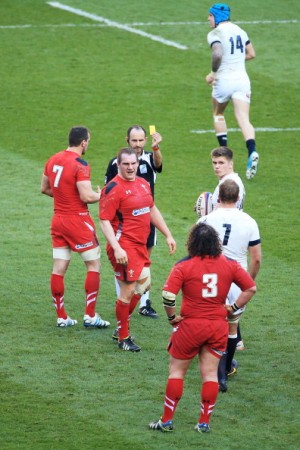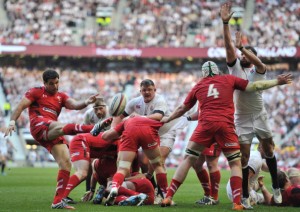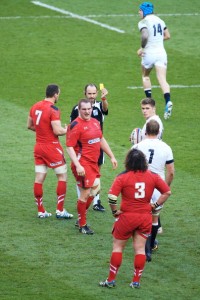
Searching for answers: George North looks downcast as Wales were out thought and out played at Twickenham
Death by a thousand cuts
Wales lost by 29-18 against England in a performance that will frustrate the players and the coaching staff as much as it will the Welsh supporters. As a result Wales are out of the 2014 RBS 6 Nations and the record breaking third consecutive championship win has gone with it. Whilst the kicking strategy and scrummaging issues will attract most of the criticism, in truth the defeat was the result of an accumulation of small, regular and costly errors in all aspects of the game.
Countless spilled balls in contact, charged-down box kicks, badly executed grubber kicks in the opposition’s 22, lineout turnovers in Wales’ 22 and the dropping of high balls when unmarked, all contributed to Wales being unable to sustain any meaningful phase play. Limited phase play meant that both Wales’ leading ball carriers and the game plan were nullified. The next few weeks and months will be a pivotal period in the Welsh camp – we shall see if the ‘small cuts’ that led to the England defeat will lead to a full autopsy.
Kicking too deep
There were many shaky aspects to Wales’ kicking game against England. But by far the most harmful were the overly deep high-balls. Some of the kicks were so deep that on occasions it was like watching a fourth down in the NFL. Regularly a Welsh kick would land in the hands of the English kick defence without a single Welsh defender being within 15 yards. It has been suggested that the Welsh kick chase was to blame, which seems unfair; Usain Bolt could have led Wales’ kick chase at Twickenham and still not have been within 10 yards of Mike Brown and Jack Nowell.
It’s often a sign of overly deep kicking if the opposition’s back three have high ‘metres with ball in hand’ stats – as they earn cheap yards running up to the defensive line before kicking clear. Both Brown and Nowell ran over 100m with the ball in hand. Brown actually carried the ball an incredible 156 metres and once again put in another career enhancing performance. Brown will be a leading contender for Player of the Tournament, and rightly so.
Gethin Jenkins’ yellow card
Gethin Jenkins received a yellow card against England – having been warned repeatedly for not driving straight in the scrum. Rugby is a game of opinions, so therefore some may argue that Jenkins body angle was a result of the England’s tight-head equally not driving straight. But rugby is only a game of opinions off the field. On the field there is only one opinion that matters – that of the referee.
Given the clear and repeated warnings from Romain Poite it is perhaps open to question that Jenkins wasn’t replaced by Paul James, sooner. Jenkins received his card in the 53rd minute and most international front row forwards are replaced at the 60-minute mark as a matter of course. For the sake of seven minutes Wales could have swapped their looseheads and kept 15 players on the pitch. Hindsight is a wonderful thing. Scratch that. It’s annoying.
Leigh Halfpenny. Devoid of blame
The sentiment that ‘you’d bet your mortgage on Leigh Halfpenny’ doesn’t quite sum up his contribution against England – you’d have bet Greece’s national debt on him such was his reliability. Halfpenny scored all of Wales’ points with a faultless six from six goal kicking display and as fine an aerial and defensive display as you will see from a full back.
His 73rd minute tackle on Luther Burrell was a remarkable feat given that Halfpenny was giving away 53lbs in weight and five inches in height – a feat that saved a nailed-on try yet will also see him miss the rest of the season with a dislocated shoulder. Halfpenny even put his head on the wrong side, deliberately, to ensure that Burrell’s body weight and reach didn’t take him over the try line. It was real David and Goliath stuff…if David had come from Gorseinon.
Wales turned their back on Danny Care
It is perhaps a sign of how pedestrian and predictable test rugby has become that the Welsh defensive line turned their backs on Danny Care when England were awarded a penalty on the Welsh five metre line. Such is the desire to score any points on any visit into the opponents 22 that it has become frowned upon to take a quick tap in such a position – pointing at the posts is the default option.
Whilst the need to take any simple points, when they’re available, is clearly understandable, particularly when you consider the narrow margins of modern Test rugby, it was fantastic to see a scrum half catching a defensive line off guard – with nothing more than a flick of the ball from his boot. Old school.








